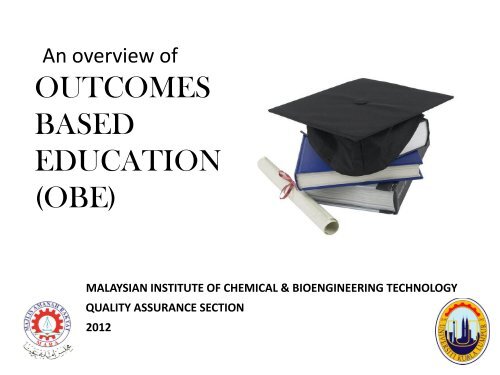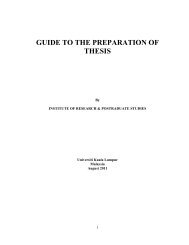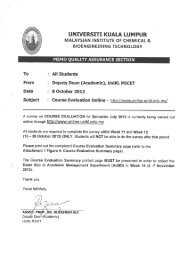OUTCOMES BASED EDUCATION (OBE) - UniKL MICET E-learning
OUTCOMES BASED EDUCATION (OBE) - UniKL MICET E-learning
OUTCOMES BASED EDUCATION (OBE) - UniKL MICET E-learning
Create successful ePaper yourself
Turn your PDF publications into a flip-book with our unique Google optimized e-Paper software.
An overview of<br />
<strong>OUTCOMES</strong><br />
<strong>BASED</strong><br />
<strong>EDUCATION</strong><br />
(<strong>OBE</strong>)<br />
MALAYSIAN INSTITUTE OF CHEMICAL & BIOENGINEERING TECHNOLOGY<br />
QUALITY ASSURANCE SECTION<br />
2012<br />
0
Abbreviations:<br />
MOHE LO Ministry of Higher Education – Learning Outcomes<br />
Domain<br />
MQA Malaysian Qualification Agency<br />
MQF Malaysian Qualifications Framework<br />
<strong>OBE</strong> Outcomes Based Education<br />
PEO Programme Educational Objectives<br />
(3-5 years after graduation)<br />
PLO Programme Learning Outcomes (upon graduation)<br />
CLO Course Learning Outcomes (upon subject completion)<br />
Program structure List of courses (subjects) in programme<br />
SLT Student Learning Time<br />
CQI Continuous Quality Improvement<br />
F2F Face to Face<br />
Non F2F Non Face to Face/Student Self Learning Time 1
What is <strong>OBE</strong>?<br />
Is a recurring education reform model. It frames itself as<br />
a student-centred <strong>learning</strong> philosophy that focuses on<br />
empirically measuring student performance, which are<br />
called outcomes:<br />
i. CLO -Course Learning Outcomes<br />
(upon subject completion)<br />
ii. PLO - Programme Learning Outcomes<br />
(upon graduation)<br />
iii. PEO -Programme Educational Objectives<br />
(3-5 years after graduation)<br />
2
i. CLO – e.g.: Demonstrate the ability to write<br />
engineering reports.<br />
ii. PLO – e.g.: Acquire knowledge of<br />
mathematics, science and engineering<br />
technology fundamentals in chemical and<br />
process engineering technology.<br />
iii. PEO – e.g.: To produce chemical engineering<br />
technologist who are capable of embarking on<br />
business and entrepreneurial activities.<br />
3
New Curriculum - <strong>OBE</strong><br />
ENTRY<br />
POINT<br />
STUDENT<br />
CENTERED<br />
LEARNING<br />
CLO<br />
<strong>OUTCOMES</strong><br />
PLO<br />
PEO<br />
MOHE<br />
LO<br />
4
MOHE LO<br />
1. Knowledge<br />
2. Practical Skills<br />
3. Thinking & Scientific Skills<br />
4. Communication Skills<br />
5. Social Skills, Teamwork & Responsibility<br />
6. Values, Ethics, Moral & Professionalism<br />
7. Information Management & Lifelong<br />
Learning<br />
8. Managerial & Entrepreneurial Skills<br />
9. Leadership Skills<br />
5
New Curriculum - <strong>OBE</strong><br />
CLO1<br />
CLO2<br />
CLO3<br />
COURSE A<br />
CLO1<br />
CLO2<br />
CLO3<br />
COURSE B<br />
PLO 1<br />
PLO 5<br />
PLO 8<br />
PLO 10<br />
PEO<br />
<strong>UniKL</strong><br />
VISION<br />
&<br />
MISSION<br />
6
<strong>UniKL</strong> Vision & Misson<br />
Our vision is to be the leading<br />
entrepreneurial technical university<br />
Our mission is to produce enterprising<br />
global technopreneur<br />
7
Learning Outcomes<br />
- as the guiding target<br />
Degrees of Learning will be measured by the<br />
knowledge gain:<br />
Measurement : Direct + Indirect<br />
i. Direct:<br />
All types of documented assessment for each course<br />
ii. Indirect:<br />
All types of tools selected to indicate <strong>learning</strong> like<br />
surveys, self rating item, third party observations.<br />
8
A credit is the agreed-upon value<br />
used to measure a student<br />
workload in terms of <strong>learning</strong> time<br />
required to complete course units,<br />
resulting in <strong>learning</strong> outcomes’<br />
(UNESCO, 2004)<br />
Achievement<br />
of Learning Outcomes<br />
Teaching/Learning + Assessment<br />
e.g. 5,600 notional SLT = 140 credits<br />
Total SLT 40 Credits<br />
CREDIT =<br />
Lecture<br />
Tutorial<br />
Laboratory<br />
Work attachment<br />
Examination<br />
Project Work<br />
Presentation<br />
Group Assignment<br />
The measurement of<br />
students’<br />
academic load<br />
Revision<br />
Study Tour<br />
Case study<br />
Studio work<br />
Field Work<br />
Industrial training<br />
Teaching Learning<br />
Activities<br />
E-Learning<br />
Demonstration<br />
Assignments<br />
Clinical<br />
Group Discussion<br />
Research Project<br />
Directed reading<br />
Student Learning Time (SLT)<br />
Notional Hours To Translate<br />
The SLT (1 Credit = 40 Hours SLT)<br />
9
Student Categories and Learning Time<br />
Total<br />
Student<br />
Time<br />
Per day<br />
24 Hours<br />
Good = Diligent<br />
Weak = Least Diligent<br />
Division of<br />
Student<br />
Time<br />
Routine<br />
Activities<br />
Self<br />
Improvement<br />
Activities<br />
Examples<br />
Sleep<br />
Self-keep<br />
Travel<br />
Work<br />
Study<br />
Hours per<br />
Week<br />
Least Diligent - 40<br />
Diligent - 48<br />
Very Diligent - 55<br />
10
Proposed Student Learning Time<br />
Item<br />
Duration (hours) or<br />
requirements F2F<br />
Proposed NonF2F<br />
(hours)<br />
Lecture 1 1-2<br />
Tutorial 1 1-2<br />
Tutorial (involving case studies) 1 3<br />
Laboratory (including report writing) 3 2-3<br />
Undergraduate Final Year Project/ Dissertation 6 - 10 credits 200 - 400<br />
Studio Work 2 2<br />
Presentation 1 3-4<br />
Coursework/Assignment 2000 words 10 - 12<br />
Creative Writing<br />
or a project that lasts a whole semester)<br />
100 – 150 pages 8-10<br />
Examination 3 10 – 20*<br />
Source: Bengkel Kebangsaan Pemantapan Sistem Kredit MQF, 31 Jan. – 2 Feb. 2005 by Quality Assurance<br />
Division, Ministry of Higher Education (Malaysia).<br />
* Proposed by MQA, depending on the field of study and the intensity of the examination.<br />
11
Module Academic Load & Credits<br />
Learning Activities F2F<br />
SLT<br />
(in hours)<br />
1 Lectures (54)<br />
a Attending Lectures 24<br />
Non<br />
F2F<br />
b Pre and Post preparation 30<br />
2 Tutorial (18)<br />
a Attending tutorial 9<br />
b Preparation for tutorial 9<br />
3 Laboratory (36)<br />
a Practical 24<br />
b Prepreparation and Report<br />
writing<br />
12<br />
Learning Activities<br />
SLT<br />
(in hours)<br />
F2F<br />
4 Assessments (23)<br />
a. 1 continuos assessement<br />
b.<br />
(1 hour + 3 hours preparation)<br />
1 presentation<br />
(1 hour + 5 hours preparation)<br />
c. 1 Final Examination<br />
(3 hour + 10 hours preparation)<br />
Subject Credit<br />
(131 ÷ 40 = 3.27)<br />
Non<br />
F2F<br />
1 3<br />
1 5<br />
3 10<br />
Total 131<br />
3<br />
12
Translating SLT for Bachelor Program<br />
5 days per week for 18 weeks*<br />
• Total Credit = 140 credit<br />
• Translates to 140 X 40 hrs SLT = 5,6000 hrs SLT for a<br />
4 years program<br />
This translates to:<br />
• 3920 hrs/3 year = 1400 hrs a year<br />
• 700 hrs per semester<br />
• 38.8 hrs a week<br />
• 7.8 hrs a day from 24 hours<br />
*18 weeks = 14 weeks of <strong>learning</strong>, 1<br />
week for mid semester break, 1 week<br />
for study week and 2 weeks for End of<br />
Semester Examination<br />
YOUR COMMITTMENT<br />
13
Translating SLT for Diploma Program<br />
5 days per week for 18 weeks*<br />
• Total Credit = 98 credit<br />
• Translates to 98 X 40 hrs SLT = 3,920 hrs SLT for a<br />
3 years program<br />
This translates to:<br />
• 3920 hrs/3 year = 1307 hrs a year<br />
• 653.5 hrs per semester<br />
• 36.3 hrs a week<br />
• 7.26 hrs a day from 24 hours<br />
*18 weeks = 14 weeks of <strong>learning</strong>, 1<br />
week for mid semester break, 1 week<br />
for study week and 2 weeks for End of<br />
Semester Examination<br />
YOUR COMMITTMENT<br />
14
How You Shall Manage Your<br />
Academic Activities<br />
Students will be responsible for meeting the many<br />
levels of <strong>learning</strong> outcomes by:<br />
• Adhering to notional Student Learning Time<br />
• Actively engaging in all <strong>learning</strong> opportunities<br />
(Face to Face and Self‐Learning)<br />
• Being aware of academic requirements, rules and<br />
regulations<br />
• Being proactive in constructing knowledge from<br />
multiple sources (print media, online media,<br />
peers, lecturers, society, environment)<br />
15
Student Assessment<br />
Multiple Methods of Assessment:<br />
• Continuous Assessment (CA): during the course<br />
– Quiz, Test, Project, Assignment, Oral Presentation,<br />
Performance, Lab Report or Soft Skills Enhancement<br />
• Final Examination (FE) – written and taken at the end of a<br />
course<br />
• Percentage between CA and FE is assigned according to the<br />
program/course.<br />
• A pass indicates attainment of the course outcome.<br />
• Excellence is indicated by an A score or 4.00 GPA<br />
16
Students’ Responsibility<br />
To know your CLO, PLO & PEO:<br />
– What you will gain throughout your programme<br />
– Characteristics that describe your ability at the point of graduation<br />
– Description of your future employment<br />
• To be well aware of your Program Structure<br />
• To know that each course (subject) <strong>learning</strong> outcomes (CLO)<br />
contributes to your overall success in the program<br />
• To know that Student Learning Time (SLT) is a guiding<br />
compass to manage your academic life<br />
• To monitor your own <strong>learning</strong> through student<br />
portfolios and seek guidance from Academic Advisor.<br />
17
Contact Details:<br />
Head of Quality<br />
Assurance Section<br />
Pn. Sa’adiah binti Hussin saadiah@micet.unikl.edu.my<br />
Tel. No.: 06 – 551 2112<br />
Fax No.: 06 – 551 2034<br />
Senior Executive Pn. Rozarina binti Saleh rozarina@micet.unikl.edu.my<br />
Tel. No.: 06 – 551 2092<br />
Fax No.: 06 – 551 2034<br />
Senior Clerk Pn. Siti Nuraiha binti Abdul Jalil sitinuraiha@micet.unikl.edu.my<br />
Tel. No.: 06 – 551 2055<br />
Fax No.: 06 – 551 2034<br />
THANK YOU<br />
©Quality Assurance Section <strong>UniKL</strong> <strong>MICET</strong> 2012<br />
18




